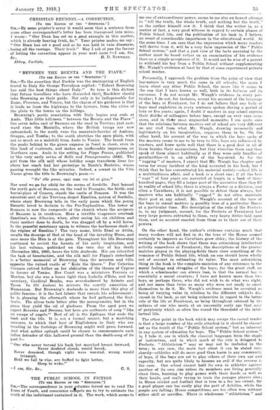" BETWEEN THE BRENTA AND THE PIAVE." [To THE EDITOR
Or THE " SPECTATOR."' SIR,—To the assertion that Ruskin was the mainspring of English travel to Italy Sir George Trevelyan replied : "Robert Browning has said the best things about Italy." So true is this dictum that future travellers who have discarded their. Baedeker should take Browning as their guide. Not only is he indispensable for. Rome, Florence, and Venice, but the charm of his guidance is that it leads us from the highways to the byways, from the cities of the plain to the towns on the hilltops.
Browning's poetic association with Italy begins and ends at Asolo. This little hill-town " between the Brenta and the Piave " lies seven miles east of Bassano on the road to Treviso; just east- ward rises the Montello, where the British troops are now entrenched; to the north runs the mountain-barrier of Asolone, Grappa, and Tomba; to the south stretches the open plain, with not so much as a molehill from Asolo to Venice. The break from the peaks behind to the green expanse in front is sheer, even in this land of contrasts, and makes an ineffaceable impression on Northern eyes. Asolo is the setting for Pippa Passes, published in-the very early series of Bells and Pomegranates (1841). The girl from the silk mill whose holiday songs transform lives far above her reach had her prototype in Dante's Beatrice, whose passing wrought the like miracles. Indeed, a sonnet in the Vita Nuova gives the title to Browning's poem :— "Ov' ella passe, ogni uom ver lei si gira."
Nor need we go far afield for the scenes of Sordello. Just beyond the north gate of Bassano, on the road to Possagno, the birth- and burial-place of Canova, stands the castle of Romano. It was the ancestral seat of-the Trevisan despot Ezzelino, patron of Sordello, whose story Browning tells in the early poem which the young Rossetti loved to declaim to the Pre-Raphaelites. The tower of Romano is now the campanile of the church where the areiprete of Bassano is in residence. Here a terrible vengeance overtook Ezzelino's son Alberioo, when, after seeing his six children and their mother done to death, he was dragged off by a wild horse. Is the peaceful sanctuary again to witness the barbarous deeds of the regime of Ezzelino ? The very name, little Etzel or Attila, recalls the Scourge of God at the head of the invading Huns, and once more the Hun is at the gate. Throughout his life Browning continued to revisit the haunts of his early inspiration, and his last volume, published on the very day of his death (December 12th, 1889), bears the title Asolando. His son inherited the task of 'benefaction, and the silk mill for Pippa's sisterhood is abetter memorial of Browning than the museum and villa opposite the ruined castle of "gate the Queen." For Caterina Cornaro retired hither on her abdication of the throne of Cyprus in favour of Venice. Her Court was a miniature Ferrara cr Mantua, but she was a lesser light than Isabella d'Este, and her secretary, Cardinal Bembo, was overshadowed by Ariosto and Tasso. In Gli Asolani he mirrors the courtly amenities of Humanism. But Browning's Asolando is more than this play of polite fancies: it is the last labour that rounds his achievement: he is gleaning the aftermath where he had gathered the first- fruits. The olives taste bitter after the pomegranates, but in the press they yield the oil of gladness. From the aged poet we expect Reveries and Dreams, but here are outbursts of song "like an escape of angels." Best of all is the • Epilogue that ends the book and the life. It is not a formal sonnet, but a marching Measure, to which that host of Englishmen in Italy who are treading in the footsteps of Browning might well press forward. And what nobler epitaph could be chosen to commemorate each fallen defender of this hallowed ground than the death-song of its poet I-
" One who never turned his back but marched breast forward, Never doubted clouds would break, Never dreamed, though right were worsted, wrong would triumph, Held we fall to rise, are baffled to fight better, Sleep to wake."


























 Previous page
Previous page